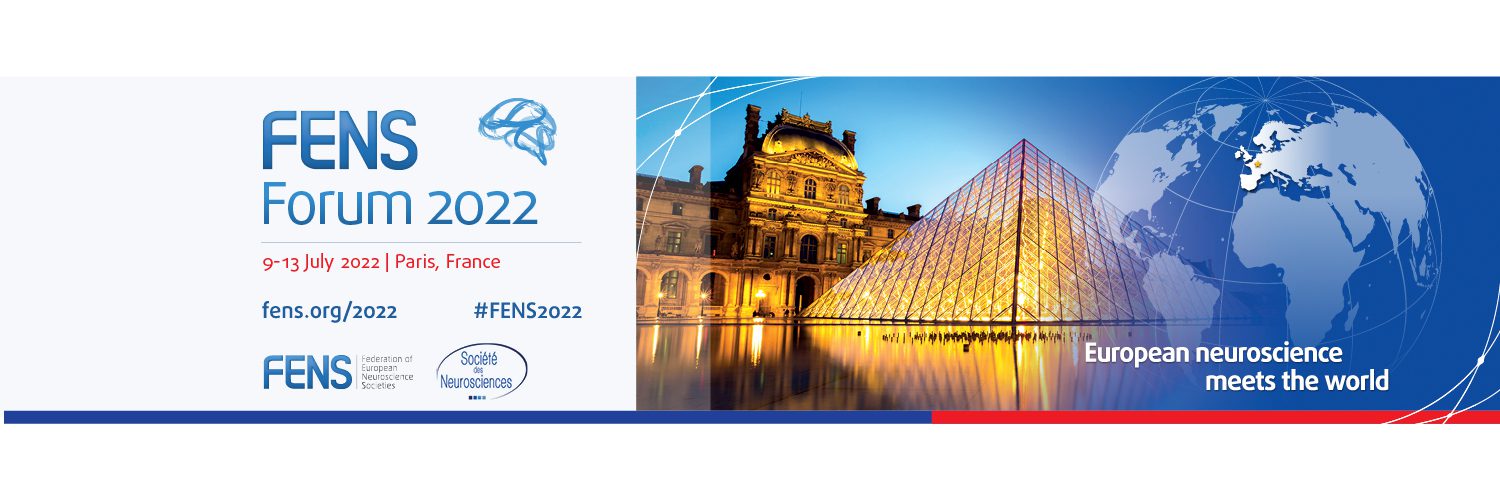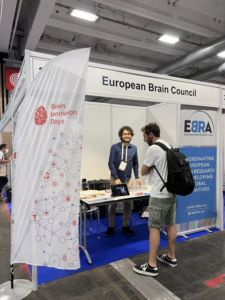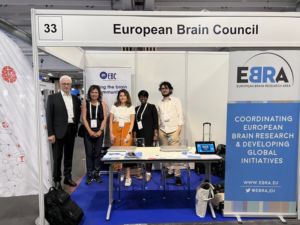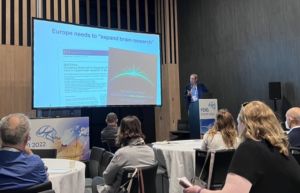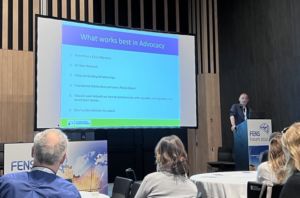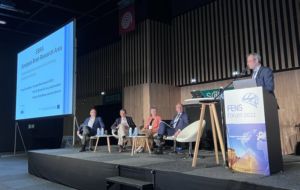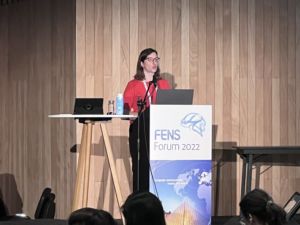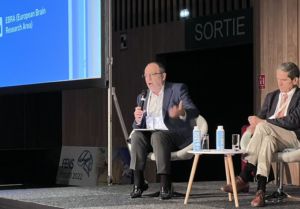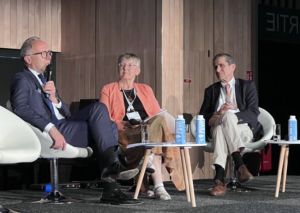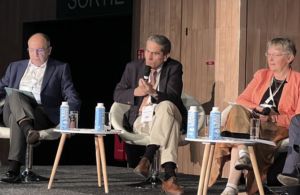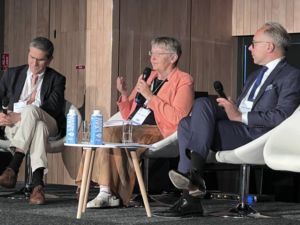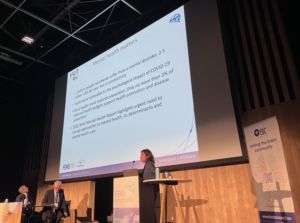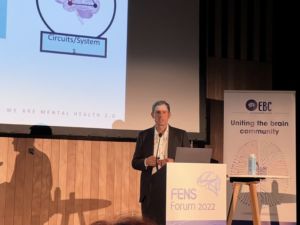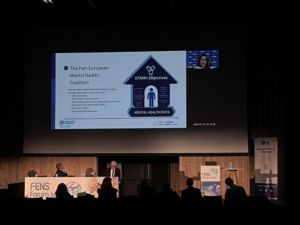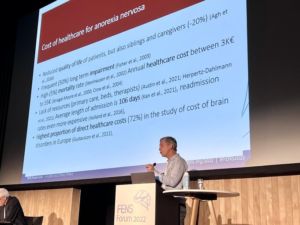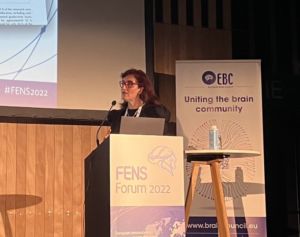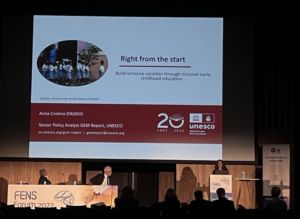EBC was pleased to be back to another in-person congress last week, attending the FENS Forum on 9-13 July in Paris, France. EBC had a series of events throughout the five days, including a permanent stand in the Exhibition Hall, which brought a lot of interest and saw many EBC materials and giveaways distributed to the 8000+ congress attendees, with plenty of interest shown towards the European Brain Research Area (EBRA) project and the upcoming 2022 Brain Innovation Days.
On Sunday, 10 July, EBC joined hosts Federation of European Neuroscience Societies (FENS) in organising a hands-on advocacy training workshop focused at the national level for FENS national societies and National Brain Councils.
Special Interest Event: The European Brain Research area: Building a Brain Health Partnership
Brain research is a rapidly evolving field and increasingly at the forefront of science. The EU and its Member States have made considerable investment in brain research leading to a significant increase of initiatives in this area. Although these initiatives have generated considerable amounts of knowledge and innovative approaches, the translation into new health interventions is hindered by the complexity of the challenge and by excessive fragmentation of efforts. Effective and efficient collaboration among the various initiatives is often identified as a key success factor to achieve the full impact of brain research. The European Brain Research Area project therefore aims to bring together the various stakeholders and major brain research initiatives, at European level and beyond, creating the conditions for real and effective cross fertilisation, dialogue, building consensus and exploiting research potential.
During this special session, the EBRA consortium — consisting of the European Brain Council, the ERANET-NEURON, the EU Joint Programme for Neurodegenerative Disease Research and the Human Brain Project — highlighted the importance of shaping the future of European and globally coordinated neuroscience and presented the Shared European Brain Research Agenda (SEBRA) to discuss the goals of building of a new partnership on brain health in Europe.
Speakers included Juan Lerma, Frédéric Destrebecq and Kristien Aarts (European Brain Council); Philippe Amouyel (JPND); Marlies Dorlöchter (ERANET-NEURON); Pawel Swieboda (Human Brain Project).
Special Interest Event: Building youth brain capital for a better European future
On July 12th 2022, the Federation of European Neuroscience Societies (FENS), the European Brain Council (EBC), the Organization for Economic Co-operation and Development (OECD) and the Brain Capital Alliance convened a meeting with experts during the FENS Forum 2022 in Paris, France to address youth brain health and brain skill challenges.
Good mental health plays a significant role in an individual’s well-being and profoundly impacts the collective economy and society. Conversely, poor mental health carries devastating public health, social and economic consequences. While youth have been relatively protected from the lethality of the COVID-19 virus itself, they have been more vulnerable to the psychological impact. Depression and anxiety went up by more than 25% in the first year of the pandemic alone. Additionally, unlike other physical health conditions, three-quarters of mental health disorders manifest before age 25. The combination of these dynamics has created conditions ripe for a secondary pandemic so called “the mental health crisis” for youth.
“We are delighted to highlight neuroscience and brain development as key to address the crisis”, noted Prof. Jean-Antoine Girault, President of the Federation of European Neuroscience Societies. “Brain development does not stop at birth and some aspects continue throughout infancy, childhood, and adolescence, allowing the full development of cognitive functions. Ongoing progress in neurobiology and cognitive neuroscience allow the design of better prevention and intervention strategies to help avoid brain deficits and/or limit their impact and maintain brain health”.
Mental health disorders cannot be ignored, nor can their devastating impact on families, communities, and lives. Prof. Wolfgang Oertel, President of the European Brain Council noted “The cost of not acting is tremendous. There is a need to improve the efficiency of brain health and care pathways, prevent avoidable deaths and implement cost-effective solutions. Youth is the future. However, recent studies underscore the severity of the mental health challenges children and adolescents face that can lead to disability, disease, and death. In Europe, there are numerous unmet needs along the care pathway, although effective early detection and interventions exist”. This is demonstrated by the European Brain Council Joint Value of Treatment Study on Anorexia Nervosa, Autism and Depression in Europe as reported by the speakers from the Hôpital Sainte-Anne, GHU Paris Psychiatrie et Neurosciences, Université de Paris, France, The London School of Economics and Political Science, United Kingdom and King’s College London, United Kingdom.
Navigating the mental health services system is often complex for families, due to services that are fragmented or disrupted. Nearly a billion people worldwide are living with a mental disorder. The WHO recently released Mental Health Report (June 2022) urges mental health decision makers and advocates to step up commitment and action to change attitudes and approaches to mental health. Policies and programmes to prevent and mitigate the negative impacts on schooling, employment, mental health, and risky behaviours are paramount. The accumulation of human and social capital must start at a young age as the brain develops rapidly during early childhood and adolescence. Moreover, early cognitive, and non-cognitive skills and health capabilities lead to enhanced effectiveness of later investment. Other eminent speakers from Boehringer Ingelheim, UNESCO and WHO participated to the meeting to emphasize the need for more integrated actions on brain health for the youth.
Harris Eyre MD PhD, lead of the new Brain Capital Alliance and co-lead of the OECD Neuroscience-inspired Policy Initiative noted, “We must prioritize youth brain capital for a flourishing and resilient European future. Youth Brain Capital Living Labs could be created for different issues in regions of Europe. By building a strong foundation, investing in optimal interventions tailored to the young generation advances socio-economic development.” Eyre is also the future Chair of Brain Capital in the recently funded PEPR ProPsy which is a program to develop precision psychiatry.
Speakers included: Prof. Jean Antoine Girault (FENS President); Prof. Wolfgang Oertel (EBC President); Prof. Harris Eyre (Lead of the Brain Capital Alliance, Co-Lead of the OECD Neuroscience-inspired Policy Initiative in collaboration with the PRODEO Institute, and Senior Fellow for Brain Capital with the Meadows Mental Health Policy Institute); Ms Vinciane Quoidbach (EBC Research project manager) Prof. Philip Gorwood (Hôpital Sainte-Anne, GHU Paris Psychiatrie et Neurosciences, Université de Paris, France); Dr Michela Tinelli (London School of Economics); Prof. Allan Young (Institute of Psychiatry, Psychology & Neuroscience, King’s College London); Dr. Joachim Scholpp (Global Head of Translational Medicine CNS & Emerging Areas, Boehringer Ingelheim); Dr Ledia Lazeri (Regional Advisor for Mental Health at WHO Regional Office for Europe); Dr Anna Cristina d’Addio (Senior Policy Analyst, Global Education Monitoring Report, UNESCO)
Contact: Vinciane Quoidbach, research project manager (EBC) vinc@braincouncil.eu


